Руководительница Фонда гарантирования вкладов физлиц получает зарплату в разы выше президента, а ее подчиненные являются владельцами элитных автомобилей и недвижимости
Электрокар за 2,5 млн, люксовые авто, поместья в Украине и за ее пределами и заоблачные зарплаты, которым могут позавидовать президенты европейских стран: похоже, чиновники Фонда гарантирования вкладов физических лиц привыкли жить «на широкую ногу». По крайней мере об этом свидетельствуют их декларации и данные реестров недвижимости. Однако, вероятно, часть драгоценного имущества руководство ФГВФЛ все же скрывает от НАПК, а вместе с ним – и… возможный бизнес в стране-агрессоре.
Так чем на самом деле владеют и как на это «заработали» подчиненные главы ФГВФЛ Светланы Рекрут? При чем здесь скандальные тендеры Фонда?
На фоне скандала с приобретением Фондом гарантирования вкладов физических лиц электрокара за 2,5 млн грн учреждение продолжает тратить немалые деньги на топливо. В частности, в январе этого года ФГВФЛ объявил миллионный тендер на закупку 15 тысяч литров дизеля. И это – при том, что, по данным YouControl, служебные машины ездят исключительно на бензине и электричестве, а дизтопливо потребляют только личные авто чиновников.
Так, как свидетельствует декларация, директор-распорядитель Фонда гарантирования имеет дизельный Range Rover Sport 2022 года выпуска, а ее муж – дизельный Mercedes GL такого же возраста. Еще одним «мерсом» на дизтопливе владеет отец Светланы Рекрут. У Натальи Рудухи, которая в феврале этого года уволилась с должности заместительницы директора ФГВФЛ после коррупционных скандалов, – тоже дизельная Audi Q5. А еще одна заместительница, Елена Нужненко, передвигается на новеньком дизельном «мерсе», зарегистрированном на ее 69-летнюю мать.
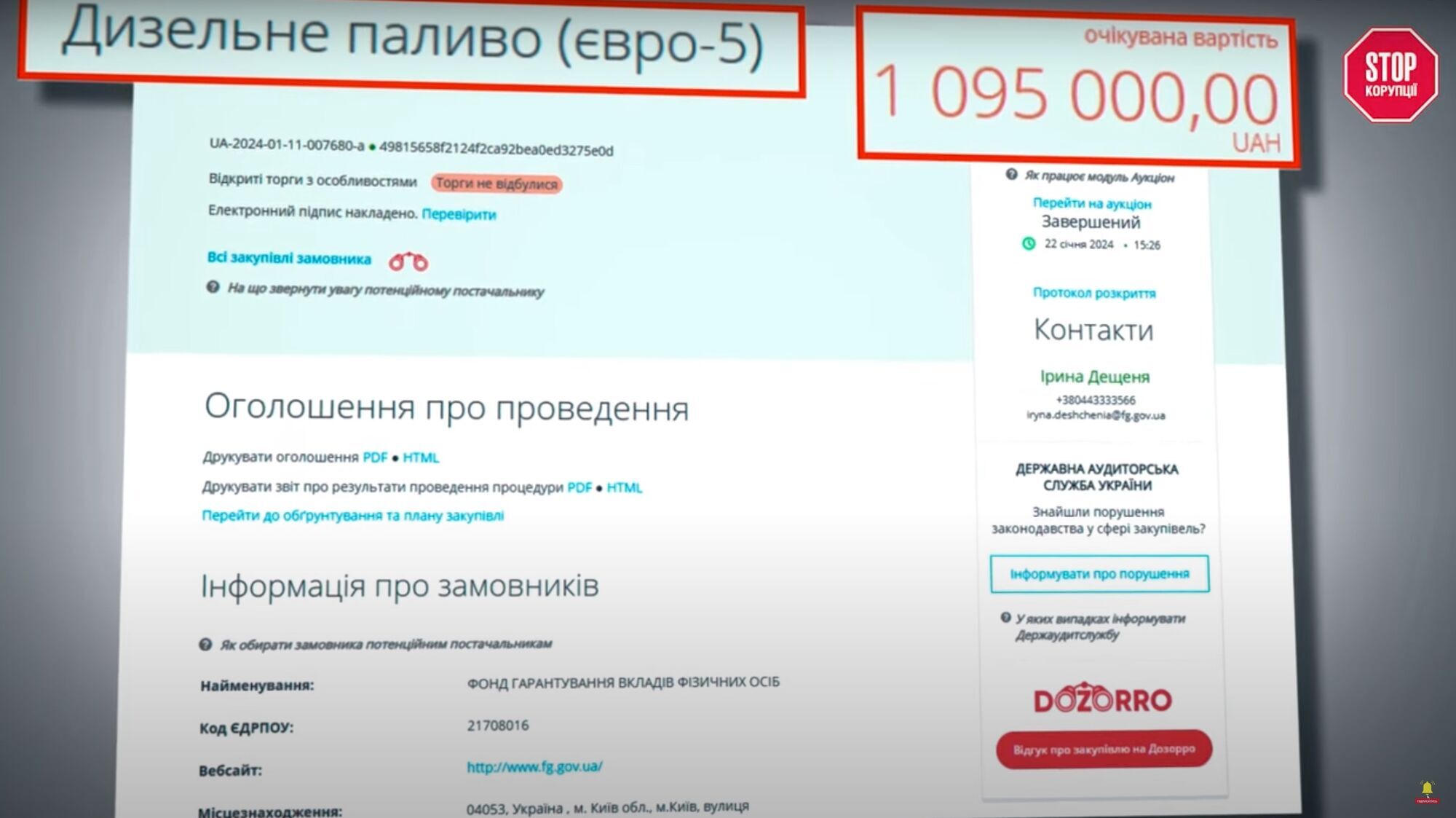
Стоимость этих дорогих автомобилей коррелирует с высокими зарплатами служащих Фонда.
«Согласно декларации, в 2023 году зарплата директора распорядителя фонда составляет 6 100 000 гривен. А у президента Украины – около 300 000 гривен. Вопрос, у кого какая мера ответственности? И это при том, что президент сказал, что все непродуктивные расходы должны просто быть исключены. И после этого они еще не стесняются получать финансовую помощь от того же Фонда гарантирования вкладов», – комментирует финансовый эксперт Дмитрий.
Для сравнения: директор Фонда Светлана Рекрут за 2022 год получила зарплату, эквивалентную 160 тысячам долларов. Это почти вдвое больше, чем у президентов Польши, Испании, Молдовы или Литвы. В то же время, в Фонде гарантирования вкладов отказались дать ответ на запрос СтопКора относительно зарплат руководства учреждения, поэтому мы анализировали эти данные в декларациях и открытых источниках.
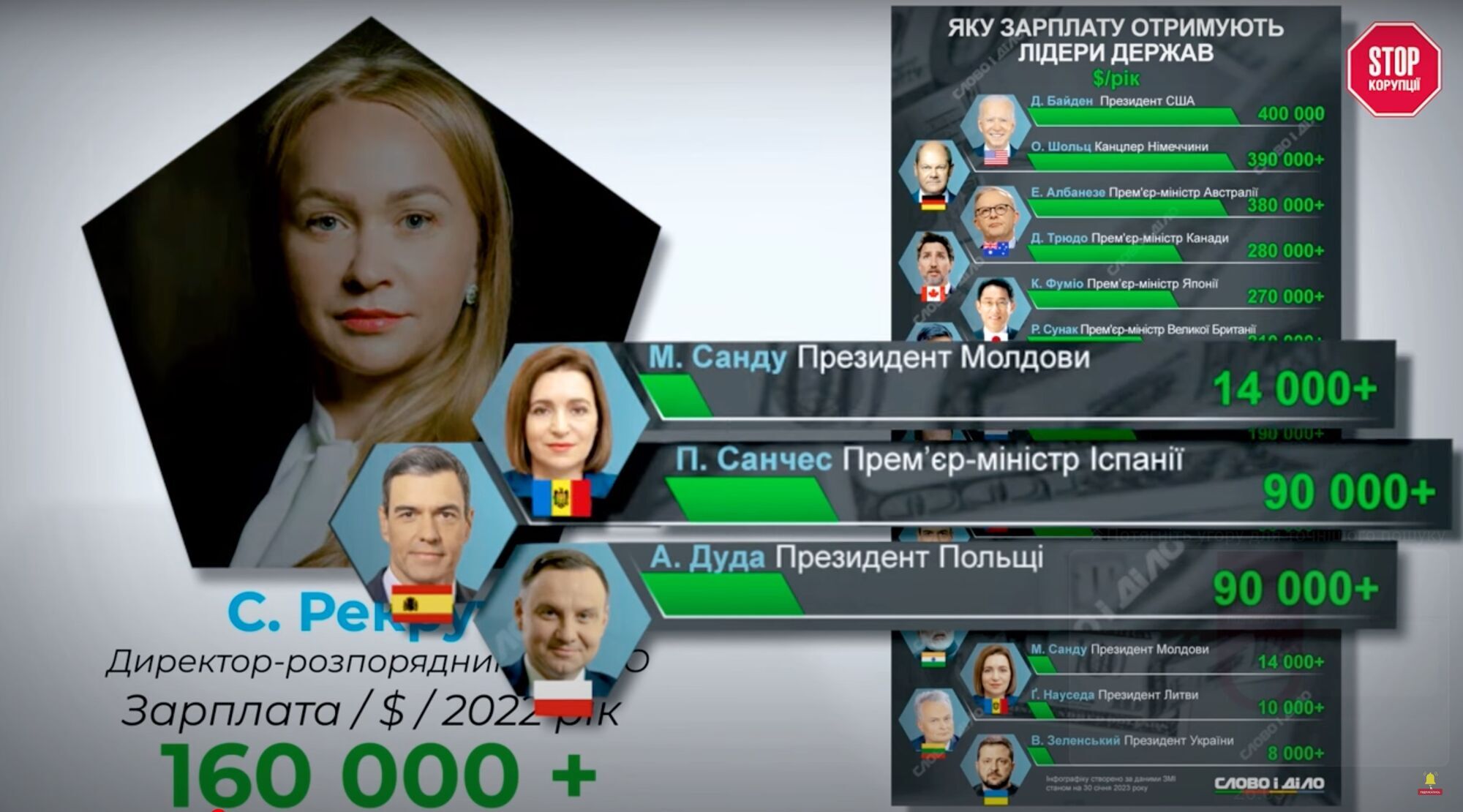
Таким образом, ежемесячно на зарплату шестерых членов исполнительной дирекции фонда, согласно данным за 2022 год, тратили более 2,6 миллиона в месяц. И это – только официальные доходы, без премий и других бонусов.
«Подчеркиваем, данные по зарплатам устаревшие, за два года они выросли существенно и выплаты продолжают повышать. Да что там исполнительная дирекция, даже у работников фонда, уполномоченных по вопросам ликвидации банков, годовая зарплата в семизначных числах. В частности, ликвидатор банков «Финансы и кредит», «Платинум» и других финучреждений Светлана Грошова за 22 год получила более 1,3 млн грн чистого дохода и задекларировала драгоценностей на 800 тыс. грн, среди которых – шуба из соболя, ювелирка и часы», – отмечает Алла Легеза.
Но и это еще не все: оказывается, человек, имеющий доступ к базе банковских данных украинцев, может иметь имущество, бизнес и семью в россии.
Так, за позапрошлый год Светлана Грошова задекларировала три авто, три квартиры и паркоместа в Киеве, квартиру и дом в Днепре, усадьбу и ряд другой недвижимости на Днепропетровщине, квартиру и другую недвижимость у моря в оккупированном Крыму. Но кроме того, у нее еще имеется немало имущества в россии, приобретенного с 2019 по 2022 год (то есть уже после начала войны на Востоке Украины), в том числе квартиры и другие нежилые помещения.
Более того, ликвидатор из Фонда гарантирования за две недели до начала полномасштабного вторжения в 2022 году сделала прямую инвестицию в экономику страны-агрессорки, став совладелицей предприятия «Картек» в россии. В указанной компании имеют долю также граждане рф и фирма VALARTIS CONSULTING, являющаяся владельцем ООО «РИМБОРСО-РУССИЯ», основной вид деятельности которого – операции по управлению проблемными активами.
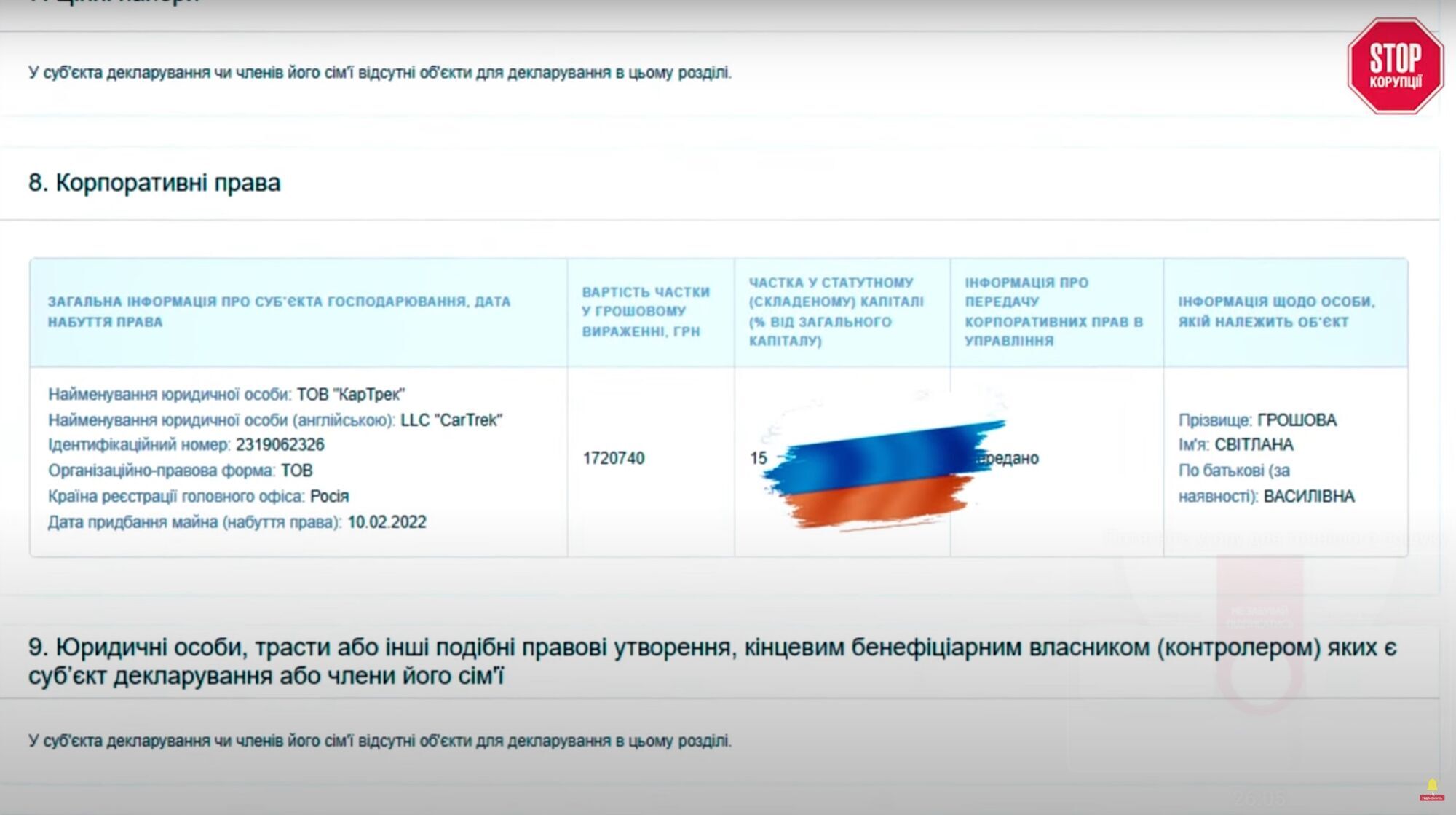
Уже в 2023 году это предприятие Грошова предположительно переписала на своего сына Станислава, проживающего в Москве и имеющего российское гражданство. И хотя на имущество ликвидаторки в конце концов наложили арест, сейчас она всячески пытается разблокировать его через суды.
«Это свидетельствует о том, что российская разведка работает по 5-балльной шкале оценки на 5 с плюсом. Я уверен, что она сына поставила учредителем на ту фирму, потому что из ФСБ ей показали пальчиком: эй, что ты делаешь? идут не случайные люди.В народе их называют «консервами», они – не активные агенты, но выполняют функцию предоставления информации», – комментирует ветеран АТО Константин Ильченко.
А как насчет руководителей структурных подразделений Фонда? Оказалось, что они тоже получают семизначные зарплаты.
Например, руководитель ИТ-департамента Фонда Андрей Бащев, согласно декларации за 2022 год, заработал более 2,2 млн и совместно с женой имеет сбережения более 10 млн грн. В собственности семьи главного ИТ-шника учреждения – четыре авто и квартиры в столице, одна из которых в самом дорогом районе Киева в ЖК «Новопечерская вежа», где цены на жилье стартуют от 3 млн грн до 14 млн. А еще у семьи есть земельные участки в Макаровском районе под Киевом.
Стопкоровцы решили их проверить и обнаружили на гугл-картах, что на них строится что-то, но дома или объектов незавершенного строительства в декларации Бащев не отметил. Приехав на место, журналисты обнаружили, что на участках уже построен роскошный дом – визуально готовый, но… незадекларированный. По словам председателя общественного совета НАПК Екатерина Бутко, это может расцениваться как нарушение в декларировании, за что, как известно, предусмотрена ответственность.
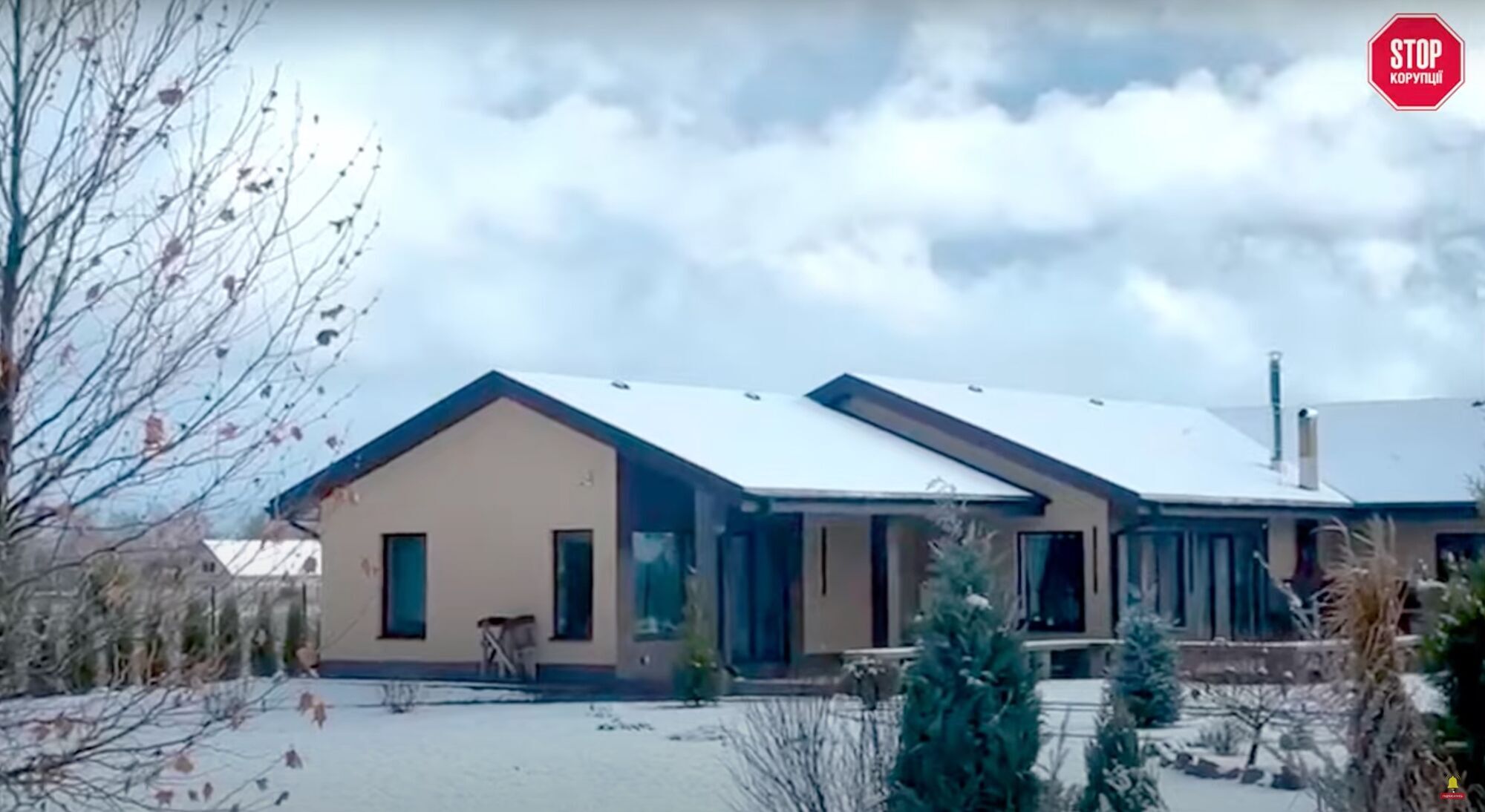
«Безусловно, нужно декларировать. Если там есть дом, если он строится и не введен в эксплуатацию, его нужно указывать в разделе по незавершенному строительству, а если он уже построен и введен в эксплуатацию, – тогда как дом», – отмечает она.
Откуда же такое состояние? Стоит напомнить, что за последние два года учреждение потратило почти 200 миллионов на закупки ИТ-услуг от компаний с криминальным прошлым и пиар в СМИ. Как стало известно СтопКору, правоохранители даже возбудили уголовное производство по растрате Фондом средств. Однако в ответе на наш запрос Фонд эти расходы назвали «потребностью в информировании общественности».
Хотя нередко такое «информирование» имеет признаки манипуляции.
В частности, это на себе испытал и СтопКор после выхода нашего предварительного расследования в эфир. Вместо того чтобы согласиться на предложение журналистов записать интервью или предоставить исчерпывающий письменный ответ на все вопросы, в учреждении начали давить на журналистов через суд и распространять дискредитационные публикации на собственном сайте и в партнерских СМИ.
«Я, как представитель руководства ВОО «Стоп коррупции» официально заявляю о попытке давления на нашу редакцию со стороны Фонда гарантирования вкладов. Вместо того чтобы ответить на вопрос, они просто пошли контратаковать журналистов. Я просто хотел бы предостеречь руководство Фонда гарантирования вкладов от давления» «Если вы думаете, что после этого вопросов журналистов станет меньше в ваш адрес, вы ошибаетесь. Их будет только больше. И поэтому готовьтесь дать ответы на эти вопросы», – отмечает соучредитель ВОО «Стоп коррупции» Роман Бочкала.
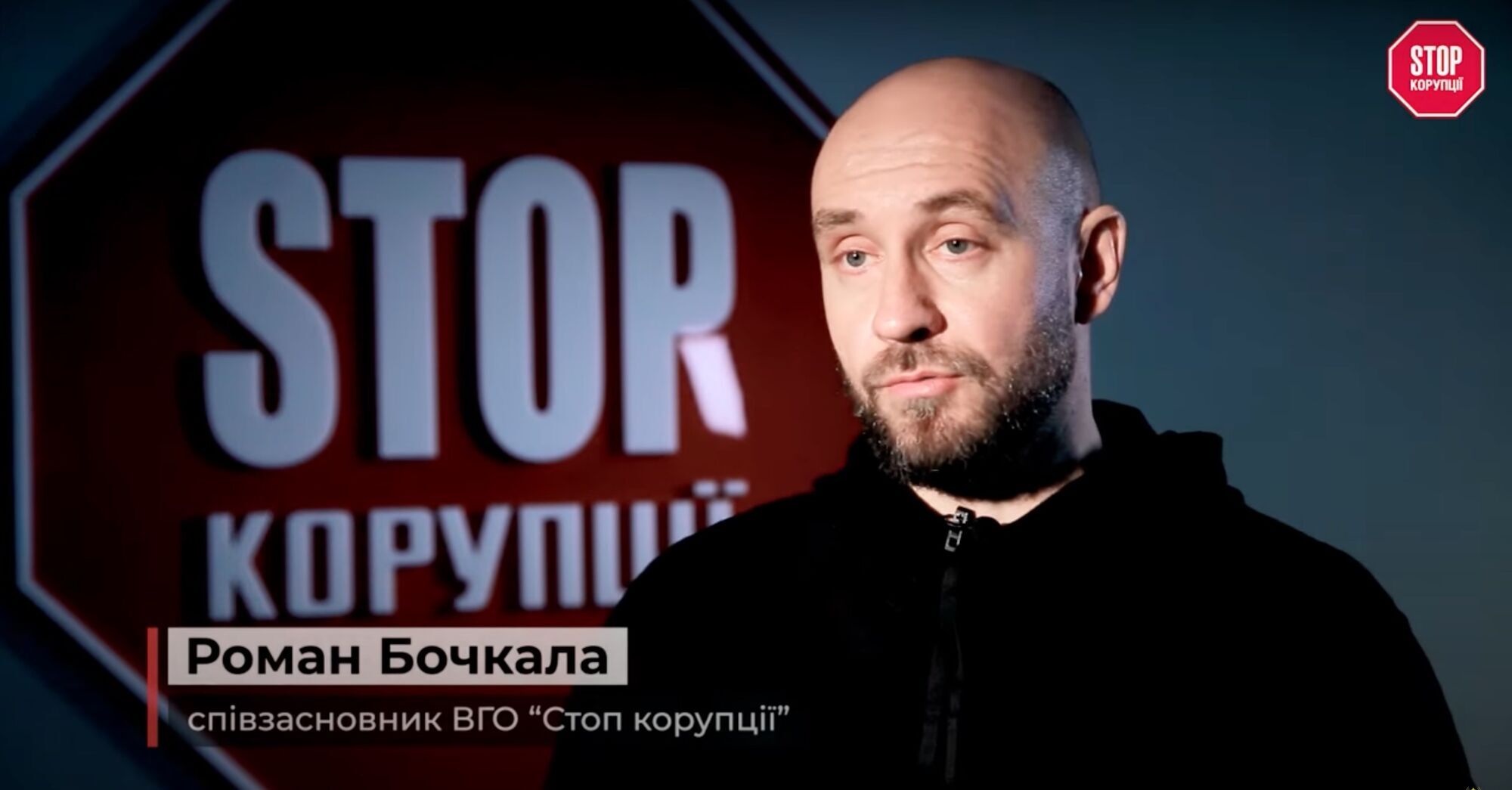
По оценке медиаэксперта Александра Чекмышева, профессора кафедры социальных коммуникаций института журналистики национального университета им. Шевченко, такие действия со стороны работников Фонда гарантирования – по меньшей мере, непрофессиональные.
«Когда речь идет о расследовании по поводу деятельности Фонда гарантирования вкладов, журналисты придерживались всех необходимых стандартов для того, чтобы сбалансировать, чтобы получить ответы и интервью. И это просто выглядит забавно с одной стороны, а с другой стороны, внушает мысль, что там действительно что-то не в порядке», – считает он.
Такая практика общения с запросчиками в учреждении не единичная, говорит адвокат Сергей Осыка, который судится с Фондом из-за игнорирования его запросов.
Так же, вероятно, шаблонна и тактика медийных атак.
По словам члена правления «Украинской инновационной компании» Алексея Богушко, Фонд гарантирования с помощью СМИ распространил клевету против компании «Укринком», где он работает также руководителем юридического департамента. Он отметил, что компания, в свою очередь, подала иск против соавторов предположительно манипулятивной статьи – нардепки Галины Янченко и директора Фонда гарантирования Светланы Рекрут.
И все это тогда, когда главной целью деятельности Фонда должна быть защита интересов вкладчиков ликвидированных банков.
В предварительном расследовании СтопКор рассказывал о том, что Фонд не выплачивает вкладчикам таких банков более 200 тысяч. В учреждении быстро отреагировали и заверили, что сегодня возвращают уже всю сумму вкладов. Действительно, такие изменения – положительные, и это заслуга парламента и президента. Однако эксперты отмечают, что всю сумму вклада возвращают только физлицам, а вот кредиторами и юридическим лицам никто не гарантирует даже возврат тех же 200 тысяч.
При этом немалую сумму учреждение тратит на загранкомандировку.
Но сколько именно и куда ездят сотрудники – тайна, говорит адвокат Сергей Осыка. Как говорится в ответе Фонда на его адвокатский запрос, «информация о количестве командировок руководства учреждения и израсходованной на поездки суммы закрыта из соображений безопасности с учетом военного положения». В то же время в соцсетях Фонда и его директора открыто рассказывают о заграничных командировках: в перечне стран, куда неоднократно ездили в командировку работники, Австрия, Венгрия, Литва, Польша, Великобритания.
С какой целью так часто на средства Фонда руководство ездит за границу и всегда ли целесообразность этих поездок оправдана – вопрос открытый. Но следует также добавить, что дети многих руководителей живут и учатся в Европе, отмечает Алла Легеза.
В частности, в Великобритании живет сын директора Фонда Светланы Рекрут. Согласно декларации, он проживает в Кембридже, в доме, арендуемом у Татьяны Лапы Энрайт. Как говорится в статье ирландского издания о том, как сын Светланы Рекрут ехал беженцом за границу, Татьяна Лапа – сестра главы Фонда гарантирования. Кстати, в соцсетях можно найти немало их общих теплых фото. Согласно данным британских реестров, Татьяна Лапа имеет в собственности косметологическую клинику и компанию по консультированию по вопросам финансового управления.
В Европе живет также сын недавно уволенной заместительницы директора Фонда Наталии Рудухи. Согласно соцсетям, он проживает и работает в Польше. В Нидерландах учится и дочь директора ИТ-департамента Фонда Андрея Бащева, у которого также десятитысячные валютные сбережения в долларах, евро и фунтах.
Напомним, за время широкомасштабной войны в ФГВФЛ потратили более 185 млн. грн. на ИТ-услуги и закупки ноутбуков. А приобретение Фондом электрокара Хенде Ионик 5 ценой около 2,5 млн грн возмутило общественность. Эта покупка даже попала в своеобразный хит-парад самых дорогих автомобилей, приобретенных государством во время вторжения


